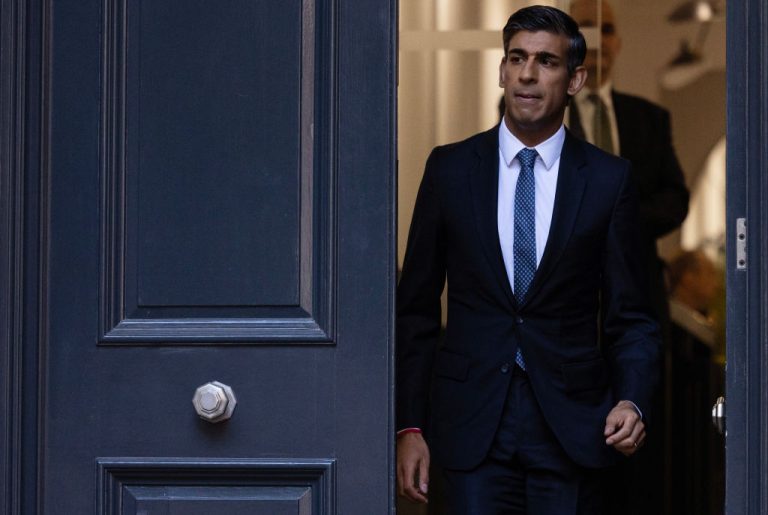News analysis
As the United Kingdom welcomes former Finance Minister Rishi Sunak as its next Prime Minister, ties between Sunak’s immediate family and a Fortune 500 Indian information technology company that’s an official partner of the World Economic Forum, soft on the Chinese Communist Party, and a staunch advocate of central bank digital currencies and social credit scores are pushed into the limelight.
The company in question is Infosys, a megafirm that trades on the New York Stock Exchange with a $76 billion market capitalization, founded by Narayana Murthy, father of Sunak’s wife, Akshata Murthy, National Pulse reported in July before Sunak was defeated by Liz Truss.
MORE ON GLOBALIST TECHNOCRACY
- Greece Moves Towards Social Credit as Digital ID App Replaces Drivers Licenses
- Uganda Set to Deploy DNA Recognition ‘Smart Digital’ Biometric ID
- Ranchers Irate as Google Installs Emissions Data Into Recipe Searches to Discourage Meat Eating
- ‘Canada’s Digital Ambition’ Brings Digital ID Social Credit to the True North
BBC described Narayana as a man “who has been dubbed the Bill Gates of India” in a Oct. 24 promotional piece on Sunak and the 42-year-old Akshata’s marriage, which was formed in 2009 and has produced two daughters.
Infosys is listed as an official partner of the World Economic Forum on the body’s website.
Success
You are now signed up for our newsletter
Success
Check your email to complete sign up
In April of 2021 at the hight of the COVID-19 pandemic, Infosys President Mohit Joshi penned an article for the bloc titled Digital Identity Can Help Advance Inclusive Financial Services.
Placed under the category “Fourth Industrial Revolution,” a moniker often pushed by the group’s frontman Klaus Schwab, author of the book COVID 19: The Great Reset, to describe the wish to change the human living condition towards one of “transhumanism” and technocracy, Joshi claimed that digital identity was a development that would free, rather than enslave, humanity.
“To get through COVID-19 as best as possible and approach its aftermath triumphantly, business and government must put power in the hands of the populace.” Joshi boasted.
The Infosys boss continued, “Catalysing a people-led recovery from the pandemic means employing new technology systems and processes, accelerating digital penetration in emerging markets to create a level playing field. The end goal? For each person to be able to buy, trade and live a fruitful life.”
Joshi posed, “But how? First, we need to follow in the footsteps of Estonia and India, with every person granted a unique digital identity so that they have full access to the digital world in the economic, social and political realm.”
In fairness to Joshi and Infosys, the rollout of a digital identification system does not inherently involve social credit systems such as vaccine passports.
In a recent examination of the digital identity implementations by the Canadian provinces of Ontario and Alberta by Vision Times, we found that while Ontario’s verbiage and implementation both specifically cited collaboration with the WEF’s technocratic agenda and was laden with overtones of social credit throughout, Alberta’s came across as comparatively and considerably more of an attempt to simply digitalize Provincial ID cards so they could be used on online government portals.
However, in an August of 2020 article, Joshi, alongside Group Treasurer for Deutsche Bank, Dixit Joshi, penned another WEF transmission that was rather candid about both their intentions for the future and their fondness of the Chinese Communist Party’s modus operandi.
Coined, Why It’s Time to Take Central Banks’ Digital Currencies Seriously, the Joshis took advantage of widespread hypochondria to declare physical currency an enemy of public health.
“Research has shown that the average European banknote plays host to around 26,000 colonies of bacteria. The human influenza virus can survive on a banknote for up to 17 days; with one-dollar and five-dollar bills changing hands more than 100 times per year on average, the risk during a global pandemic is considerable,” the issuance stated.
The pair then went on to praise the Chinese central bank, the People’s Bank of China, for its issuance of a digital yuan, a tool that has become central to Xi Jinping’s ruinous Zero-COVID campaign, “Who then can blame the People’s Bank of China (PBOC) when it announced in February that it would be destroying cash collected in high-risk environments, such as public transport, markets or in hospitals?”
The authors cited two different branches of Communist Party propaganda outlets to laud the e-RMB’s rollout into cities as large as the Shenzhen technological hub, in addition to an “expectation…that these pilots will extend to the venue for the 2022 Beijing Winter Olympics.”
The authors continued to promote the Party’s system, “The potential for China here is immense. If the e-RMB is adopted broadly as a system to streamline trade and reduce risk, China could become the world’s trade banker, as well as its factory.”
But quickly twisted the issue, again, into one that claimed central digital command economies would be of benefit to humanity, “Yet the bigger goal for China is actually more local, and relates to financial inclusion. Digitising the RMB will grant access to financial services to hundreds of millions of citizens, including some of the most disadvantaged. This benefit is something that can be applied to any country across the world.”
However, the reality of “Zero-COVID” for the Chinese people has been demonstrated thoroughly by online accounts such as Twitter’s @songpinganq who utilize excerpts from Chinese social media to evidence a reality that is anything but utopian.
Such videos routinely show the daily race of tens of thousands of workers to leave their jobs in the evening to stand in line, often for hours, for a daily PCR test to maintain their green “Health Code” in order to continue to utilize public and private transportation, return to work the next day, and continue to access their bank accounts, which are linked to the Wechat surveillance app.
Striking a deal with the CCP?
As for Sunak himself, The Washington Examiner noted in July before losing to Truss that, “Regardless, the Chinese Communist Party is all in for Sunak” based on an official endorsement published the same day in CCP mouthpiece Global Times.
And while Global Times appeared to simply clamor about how “the UK will find new opportunities and could become more competitive by improving ties with China,” the Examiner noted, “Unfortunately, Sunak appears open to striking a deal with the Communist devil.”
The outlet framed its position based on Sunak’s overwhelming dovishness towards the Party in a July 1, 2021 speech made during his time as Chancellor of the Exchequer under Boris Johnson as Sunak “rebuked parliamentarians calling for a tougher stance against Beijing,” the Examiner stated.
Sunak also has a history showing a clear taste for central bank digital currencies.
In July of 2021, the UK’s Daily Mail reported, “Cash in people’s pockets would be superseded by a new ‘Britcoin’ digital currency in a plan being pushed by Chancellor Rishi Sunak.”
The article stated that the idea was floated as a way to distribute helicopter economic stimulus payments to the populace affected by the mandate of business-crushing COVID lockdowns.
What’s the big deal?
For the uninitiated, the reason many fear the implementation of CBDCs is not because of the replacement of cash, but because digital currencies will involve “smart contract” functions.
For example, DIIA, Ukraine’s social credit digital currency app, was found early in the war to issue digital currency to users in exchange for behavioral compliance on mission critical mandates such as mass vaccination.
However, the “money” deployed operated much less like cash and much more like food stamps. In one such example, the compliant were given digital tokens that could only be spent on books sold by state-approved publishers.
In April of this year, Bank of Canada Deputy Governor Timothy Lane was quoted as directly stating such at a crypto-themed conference hosted by the Postmedia cartel’s Financial Times, “Central banks’ involvement might well be creating something that is basically digital fiat, but then it would be for the private sector to innovate and figure out ways of using it and incorporating it in smart contracts.”
Deputy Governor Lane further noted that smart contract implementation was inevitably to be a “public private” partnership, “Most of those are not going to come from the basic design of the CBDC…They’re going to come from the various other companies that are going to find ways of using it in their transactions.”
Lane additionally stated, “The central bank would still be issuing the CBDC and it would still be a liability to the central bank, but all a lot of those uses and sort of how it would be brought to the public … would inevitably involve a high degree of private sector development and collaboration.”







